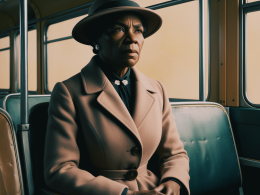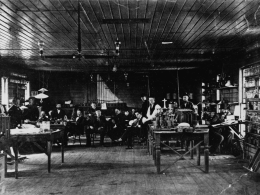Table of Contents Show
I. Early Life and Formation: The Grocer’s Daughter
Margaret Hilda Roberts was born on October 13, 1925, in the market town of Grantham, Lincolnshire, far removed from the halls of power she would one day dominate. Her father, Alfred Roberts, was a grocer and a Methodist lay preacher, a man of staunch principles and an unwavering work ethic. It was in the backroom of her father’s shop that Margaret’s character was forged—a blend of thrift, self-discipline, and an unyielding belief in the value of hard work. Alfred Roberts was more than just a shopkeeper; he was an influential local politician who served as mayor of Grantham. From him, Margaret inherited not only a belief in the virtues of individual responsibility and self-reliance but also an early exposure to the workings of local government.
Margaret’s upbringing was strict, with little room for frivolity. Her father’s Methodism emphasized moral rectitude and a sense of duty—traits that would become hallmarks of her political philosophy. Her mother, Beatrice, was more reserved, a supportive presence in the background who maintained the household while Alfred engaged in public life. The Roberts household was modest but respectable, and young Margaret was expected to contribute from an early age, whether it was helping in the shop or excelling in her studies.
Education was Margaret’s passport to a wider world, and she excelled in school, earning a scholarship to Kesteven and Grantham Girls’ School. There, she was a diligent student, developing a particular interest in chemistry, which would lead her to Somerville College, Oxford, in 1943. At Oxford, Margaret studied under Dorothy Hodgkin, a future Nobel laureate in chemistry, and while her academic focus was on science, it was in the crucible of Oxford’s political debates that her future path began to take shape. She became involved with the university’s Conservative Association, where her political views—shaped by her father’s influence—began to crystallize.
The end of World War II brought Britain to a crossroads, and the political landscape was shifting. The Labour government under Clement Attlee was embarking on a program of nationalization and welfare expansion, a direction that Margaret found troubling. To her, this was the antithesis of the values she had been raised with, and it strengthened her resolve to pursue a political career in defense of individual freedom and market principles.
Margaret Roberts graduated from Oxford in 1947 with a degree in chemistry, but her ambitions were already turning towards politics. She worked briefly as a research chemist, but the world of science could not contain her drive. In 1951, she married Denis Thatcher, a successful businessman, who provided her with the financial security and support she needed to fully engage in her political career. The marriage was a partnership in the truest sense, with Denis remaining a steady and supportive presence as Margaret climbed the political ladder.
II. The Rise to Power: From Finchley to Downing Street
Margaret Thatcher’s ascent to power was neither swift nor easy, but it was marked by a determination and clarity of purpose that would become her trademark. Her first foray into politics came in 1950 when she stood as the Conservative candidate for the Labour stronghold of Dartford. Although she lost the election, her spirited campaign, at just 24 years old, garnered attention and marked her as a rising star within the Conservative Party.
In 1959, after several years of building her political career and honing her skills as a barrister, Thatcher was elected as the Member of Parliament for Finchley, a solidly Conservative seat in North London. This victory was the culmination of a decade of perseverance and hard work, but it was only the beginning of her journey. In the male-dominated world of British politics, Thatcher quickly distinguished herself with her tenacity, sharp intellect, and mastery of detail. She was not content to be a backbencher, and her ambitions were clear to those around her.
Thatcher’s first significant government role came in 1961 when she was appointed Parliamentary Under-Secretary for Pensions and National Insurance under Harold Macmillan’s government. It was a junior position, but it allowed her to begin shaping her ideas on social policy, particularly in her growing opposition to what she saw as the excessive state intervention in the economy and the lives of individuals.
The Conservative Party, however, was in turmoil during the 1960s, losing the general election in 1964 and again in 1966. It was a time of reflection and recalibration for Thatcher, who was becoming increasingly convinced that the party needed to shift away from the post-war consensus of state-led economic management. Her views were influenced by her reading of free-market economists like Friedrich Hayek and Milton Friedman, who argued for reduced government control and the primacy of the free market.
In 1970, Thatcher was appointed Secretary of State for Education and Science in Edward Heath’s Conservative government. It was a position that placed her at the center of one of the most contentious issues of the day—education reform. Thatcher’s decision to abolish free milk for schoolchildren earned her the enduring nickname “Margaret Thatcher, Milk Snatcher,” a moniker that reflected both the public’s resistance to her policies and her willingness to make unpopular decisions.
But it was not until the Conservatives’ crushing defeat in the February 1974 general election that Thatcher’s opportunity truly came. The loss prompted a leadership crisis within the party, and Thatcher, with her clear vision of economic reform and her critique of Heath’s approach, challenged him for the leadership. In a surprise to many, she won the leadership election in 1975, becoming the first woman to lead a major political party in the United Kingdom. It was a victory that shocked the British political establishment, but it also set the stage for a transformative period in British history.
As leader of the opposition, Thatcher focused on developing a coherent and radical economic policy based on reducing the power of the state, curbing inflation, and revitalizing the British economy through deregulation and privatization. Her speeches during this period were a clarion call for a new direction in British politics, one that rejected the consensus politics of the post-war era in favor of a return to individual responsibility and free-market principles.
By the time the 1979 general election approached, Britain was mired in economic stagnation and industrial strife, a condition famously described as the “Winter of Discontent.” Thatcher’s message of economic revival, law and order, and national renewal resonated with an electorate weary of strikes, inflation, and government inefficiency. The Conservatives won a decisive victory, and on May 4, 1979, Margaret Thatcher became Britain’s first female Prime Minister, a position she would hold for more than a decade, reshaping the nation in her image.
III. The Thatcher Revolution: Economic Reforms and Social Upheaval
Margaret Thatcher’s premiership was defined by a radical agenda of economic reform that sought to reverse what she saw as Britain’s post-war decline. Her approach was underpinned by a conviction that the state had grown too large, that unions had become too powerful, and that the British people needed to be liberated from the shackles of socialism. It was a revolution from above, driven by a leader who was determined to change the course of the nation, regardless of the cost.
One of Thatcher’s first and most controversial acts as Prime Minister was to confront the power of the trade unions, which she believed were strangling the British economy with their frequent strikes and demands for higher wages. The 1984–1985 miners’ strike became the defining battle of her premiership. Thatcher refused to back down, insisting that the government would not be held hostage by the unions. The strike ended in defeat for the miners, marking a turning point in British industrial relations and significantly weakening the power of organized labor. For Thatcher, this was not just an economic victory but a moral one, affirming her belief in the primacy of the individual over collective action.
Thatcher’s economic policies, often referred to as Thatcherism, were centered on reducing the role of the state in the economy. She embarked on a sweeping program of privatization, selling off state-owned industries such as British Telecom, British Gas, and British Airways. These moves were intended to create a property-owning democracy, where ordinary citizens would have a stake in the economy through ownership of shares and homes. The right-to-buy scheme, which allowed council tenants to purchase their homes at discounted prices, was one of Thatcher’s most popular policies, symbolizing her commitment to individual aspiration and self-reliance.
However, Thatcher’s economic reforms came at a high social cost. Her government’s tight monetary policies, designed to curb inflation, led to a sharp rise in unemployment, which reached over three million by the early 1980s. Entire communities, particularly in the industrial heartlands of the North, were devastated by the closure of factories and mines. Thatcher’s response was unsympathetic; she believed that economic pain was necessary to purge the British economy of inefficiency and to create a more dynamic, competitive society. Her critics accused her of creating a divided nation, where the rich got richer while the poor were left to fend for themselves.
Internationally, Thatcher’s tenure was marked by her strong relationship with U.S. President Ronald Reagan, with whom she shared a common belief in free markets, a strong national defense, and a deep distrust of the Soviet Union. This “special relationship” between the U.K. and the U.S. was a cornerstone of Thatcher’s foreign policy, and it played a significant role in the eventual end of the Cold War. Thatcher was a staunch anti-communist, famously declaring that she could do business with Soviet leader Mikhail Gorbachev, whom she described as “a man we can do business with,” paving the way for a thaw in East-West relations.
Thatcher’s staunch anti-communism and alignment with the United States also led to her support for NATO’s deployment of cruise missiles in Europe, a decision that was deeply unpopular in Britain and across Europe but one she believed was necessary to counter the Soviet threat. Her foreign policy was driven by a belief in national sovereignty and a distrust of supranational institutions. This was evident in her approach to the European Economic Community (EEC), the precursor to the European Union. While Thatcher was initially supportive of Britain’s membership in the EEC, her growing concern over the loss of British sovereignty led to increasingly strained relations with other European leaders. Her famous 1988 Bruges speech, in which she declared, “We have not successfully rolled back the frontiers of the state in Britain, only to see them reimposed at a European level,” set the stage for the euroscepticism that would later dominate British politics.
Thatcher’s determination to assert Britain’s power on the world stage was also evident in the Falklands War of 1982. When Argentina invaded the British-held Falkland Islands, Thatcher’s response was swift and decisive. She dispatched a naval task force to reclaim the islands, and the successful military campaign bolstered her popularity at home, reinforcing her image as a strong and resolute leader. The Falklands War was a defining moment in Thatcher’s premiership, demonstrating her willingness to use military force to defend British interests and her belief in the importance of national pride and sovereignty.
Yet, as much as Thatcher’s policies reshaped the British economy and society, they also sowed the seeds of deep division. The 1980s were a time of stark contrasts in Britain—while the financial markets boomed and a new class of wealthy entrepreneurs emerged, poverty and inequality grew, particularly in the areas most affected by deindustrialization. The urban riots of 1981 in Brixton, Toxteth, and other inner-city areas were a stark reminder of the social discontent simmering beneath the surface of Thatcher’s Britain. Her government’s response was to double down on law and order, with increased police powers and a focus on individual responsibility rather than addressing the underlying causes of social unrest.
Thatcher’s unyielding approach to governance earned her the nickname “The Iron Lady,” a moniker originally intended as an insult by the Soviet press but one she embraced with pride. It captured the essence of her leadership style—tough, uncompromising, and willing to make difficult decisions, no matter the political cost. This iron will, however, would eventually contribute to her downfall, as her increasingly autocratic style alienated not only her political opponents but also members of her own party.
IV. The Fall: Leadership Challenges and the End of an Era
As the 1980s drew to a close, Margaret Thatcher’s grip on power began to weaken, undermined by a series of political missteps and growing dissent within her own Conservative Party. The seeds of her downfall were sown by her uncompromising stance on several key issues, most notably her approach to Europe and the introduction of the deeply unpopular Community Charge, commonly known as the “poll tax.”
Thatcher’s growing euroscepticism put her at odds with many in her cabinet, who favored closer ties with Europe. The debate over Britain’s role in the European Exchange Rate Mechanism (ERM), a precursor to the euro, became a flashpoint. Thatcher’s reluctance to fully commit to the ERM and her increasingly strident rhetoric against European integration alienated key figures within her government, including her Chancellor of the Exchequer, Nigel Lawson, and Foreign Secretary, Geoffrey Howe. Howe’s resignation in 1990, accompanied by a devastatingly critical speech in the House of Commons, struck a significant blow to Thatcher’s authority and signaled that her support within the party was eroding.
The introduction of the poll tax in 1989 was another pivotal moment in Thatcher’s decline. The tax, which replaced local rates with a flat-rate levy on every adult, regardless of income, was intended to make local government more accountable. However, it was widely perceived as unfair, disproportionately affecting the poor and leading to widespread protests and civil disobedience. The most significant of these protests was the Poll Tax Riots in London in March 1990, where tens of thousands of people clashed with police in scenes of violence and chaos that shocked the nation. The poll tax became a symbol of Thatcher’s increasing disconnect from the public and her refusal to listen to dissenting voices.
By late 1990, Thatcher’s leadership was under siege. The internal divisions within the Conservative Party, coupled with her declining popularity in the polls, emboldened her critics. When Michael Heseltine, a senior Conservative MP and former cabinet minister, challenged her for the party leadership in November 1990, it was clear that Thatcher’s once unassailable position was in jeopardy. Although she won the first ballot, she fell short of the majority needed to avoid a second round, and after consulting with her closest advisors, she reluctantly decided to resign as Prime Minister on November 28, 1990.
Thatcher’s resignation marked the end of an era in British politics. Her departure from Downing Street was both dramatic and poignant; after more than 11 years in power, the longest continuous tenure of any British Prime Minister in the 20th century, she left office tearfully, her departure a testament to the ruthless nature of political life. Yet, even as she stepped down, the legacy of her transformative policies continued to shape the nation.
V. Legacy: The Iron Lady’s Enduring Influence
Margaret Thatcher’s legacy is one of the most contentious in modern British history. To her supporters, she is a savior who rescued Britain from economic decline, revitalized the nation’s economy, and restored a sense of national pride and purpose. To her detractors, she is a divisive figure whose policies exacerbated social inequality, undermined community solidarity, and eroded the post-war consensus that had defined British politics for decades.
Thatcher’s economic policies, known collectively as Thatcherism, have had a lasting impact on the British economy and political landscape. The privatization of state-owned industries and the deregulation of financial markets fundamentally transformed the British economy, leading to a period of sustained growth and the emergence of London as a global financial center. The shift towards a more market-driven economy and the reduction of the state’s role in economic management became the new orthodoxy, influencing not only the Conservative Party but also the Labour Party, which, under Tony Blair, embraced many of the principles of Thatcherism.
Yet, the social consequences of Thatcher’s policies have been the subject of intense debate. The decline of traditional industries and the rise of the service economy created deep regional disparities, with the North of England and Scotland bearing the brunt of deindustrialization. The weakening of trade unions and the emphasis on individualism over collective action reshaped British society, leading to a more atomized, consumer-driven culture. For many, Thatcher’s Britain was one of winners and losers, where the gap between the rich and the poor widened, and social cohesion was undermined.
Thatcher’s impact on British politics extended beyond her economic policies. Her emphasis on national sovereignty and her skepticism of European integration laid the groundwork for the eurosceptic movement within the Conservative Party, which would eventually lead to the Brexit referendum in 2016. Her approach to governance, characterized by strong, centralized leadership and a willingness to take on entrenched interests, has influenced subsequent Prime Ministers, both Conservative and Labour.
Internationally, Thatcher’s legacy is also significant. Her close relationship with Ronald Reagan and her role in the Cold War, particularly in supporting the U.S. strategy of confronting the Soviet Union, have been credited with contributing to the eventual collapse of communism in Eastern Europe. Her assertive foreign policy, exemplified by the Falklands War, reinforced Britain’s status as a global power, albeit one increasingly reliant on its alliance with the United States.
After leaving office, Thatcher remained an influential figure in British and global politics. Her memoirs, The Downing Street Years (1993) and The Path to Power (1995), provided her own account of her time in office and her vision for Britain’s future. Although she largely withdrew from public life in her later years, her views continued to shape political discourse, and she remained a revered figure within the Conservative Party until her death on April 8, 2013.
Margaret Thatcher’s life and career remain the subject of intense study and debate. She was a leader who defied the conventions of her time, a woman who rose to power in a male-dominated world and who reshaped Britain in her image.
Her legacy is a complex and contested one, reflecting the profound changes she brought to Britain and the polarizing nature of her leadership. For many, she remains an icon of conservative principles—a champion of free markets, personal responsibility, and national sovereignty. Her image, with its iconic handbag and unwavering resolve, continues to symbolize a particular brand of leadership that is both admired and reviled.
Thatcher’s influence extended far beyond her time in office. The political landscape she helped to shape persisted well into the 21st century, with both major British political parties adapting their platforms in response to the new economic and social realities she had created. The Labour Party’s shift towards the center under Tony Blair, with the embrace of “New Labour” policies that accepted many of Thatcher’s economic reforms, demonstrated the enduring impact of her premiership. Even as new challenges emerged, the ideological framework established during the Thatcher years continued to inform political debates on issues such as public spending, welfare reform, and Britain’s relationship with Europe.
In her later years, Thatcher became a figure of veneration among conservative circles around the world. Her approach to governance influenced leaders from Ronald Reagan in the United States to more recent conservative figures, who saw in her tenure a model of how to implement sweeping changes in the face of opposition. The “Thatcher Revolution” became a template for those who sought to roll back state intervention and promote free-market principles in their own countries.
However, the divisions she left behind have also persisted. In many parts of Britain, particularly in the former industrial regions that bore the brunt of her economic policies, Thatcher’s name is still synonymous with hardship and decline. The communities that lost their industries during her time in power often struggled to recover, and the social fabric of these areas was permanently altered. The polarization of opinion about her legacy is a testament to the far-reaching consequences of her decisions, which continue to resonate decades after she left office.
Margaret Thatcher’s death in 2013 prompted a wave of reflection on her life and legacy. Her funeral, held with full military honors, was attended by dignitaries from around the world, a final acknowledgment of her stature as one of the most significant political figures of the 20th century. Yet, even in death, she remained a divisive figure, with demonstrations and protests accompanying her funeral, highlighting the deep and lasting impact she had on British society.
Ultimately, Margaret Thatcher’s legacy is one of transformation. She was a leader who did not merely manage the status quo but sought to remake Britain according to her vision. Her influence extended beyond the policies she implemented; it was about changing the way people thought about government, economics, and society. Thatcher once famously said, “There is no such thing as society. There are individual men and women and there are families.” This statement, more than any other, encapsulates her philosophy and the way in which she redefined the relationship between the state and the individual.
In the years since her death, historians, politicians, and the public continue to grapple with the full implications of Margaret Thatcher’s legacy. She was a leader who inspired both fierce loyalty and deep animosity, a politician who was both a product of her time and a force for change. Whether viewed as a hero or a villain, Margaret Thatcher remains a towering figure in British history—a woman whose vision and determination left an indelible mark on the nation and the world.







